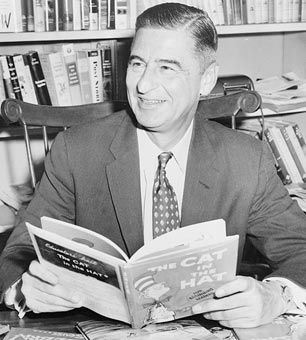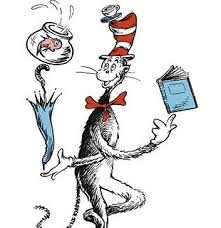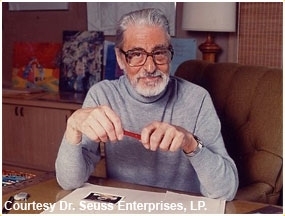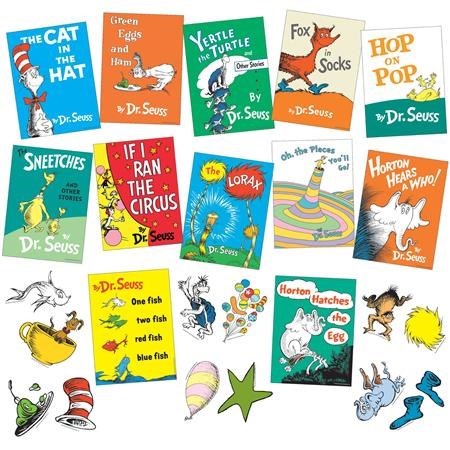 |
| (http://www.truth-out.org/news/item/14765-radical-r ()) |
"Think left and think right and think low and think high. Oh, the things you can think up if only you try!"("Dr. Seuss Quotes."). Children's author Theodor Seuss Geisel, otherwise known as Dr. Seuss or Theo LeSeig, had a mind that never stopped thinking or trying. He was born on March 2, 1904 in Springfield, Massachusetts. Though he exhibited talents of an artist and writer, he did not plan to become an author or illustrator in his time of youth ("Theodor Seuss Geisel."). Rather, he began his writing career in high school and college where he contributed to the school newspaper and magazine (Carey). Geisel began to use the pseudonym Dr. Theophrastus Seuss, shortened to Dr. Seuss, when he was kicked off his magazine staff after caught drinking in his dormitory ("Dr. Seuss."). Finally with the encouragement of a fellow classmate, Geisel dropped out of college in 1926 to officially pursue his artist career ("Theodor Geisel."). In 1937, a colleague published Geisel's first book And to Think I Saw It on Mulberry Street after its 27th rejection and revision. Without delay, Geisel successfully challenged children's literature with the publication of his book, The Cat in the Hat in 1957. The Cat in the Hat changed the literacy rate of children by showing reading could be fun, even with a limited vocabulary. Eventually, Geisel died of oral cancer on September 24, 1991 in his home in La Jolla, California at the age of 87 ("Dr. Seuss."). Geisel's legacy demonstrates that a hero is someone who must give hope to others with a strong sense of passion and bravery in their path of life. Dr. Seuss's originality and creativity as a children's book author demonstrates his bravery and perseverance as a hero.
 |
| (seuss.wikia.com ()) |
Dr. Seuss shows his bravery through his confrontation against those who hindered his path as an author and against the ideals of children literature. Dr. Seuss did not begin his artist career until later in his life because others told him at a young age that art was not his future as: "His high school teacher told him, 'You will never learn to draw, Theodor. Why don't you just skip this class for the rest of the term'" ("Theodor Seuss Geisel."). Times and time again, people told Dr. Seuss that he could not be an artist; however he took these threats and used them for positive results, developing his own artistic style. This reveals his courage as he fought against the views of others and used what would have intimidated others as his primary strength. Additionally, Dr. Seuss lived during a time where children's books were overlooked as many thought that were filled with useless tidbits of limited vocabulary and plot devices. Dr. Seuss changed this all when: "...Houghton Mifflin and Random House asked him [Seuss] to write a children's primer using 220 vocabulary words" ("Dr. Seuss."). Dr. Seuss did what others thought impossible by writing a fascinating children's book, The Cat in the Hat, that kids could understand with their minimal vocabulary. By challenging the opinions of children's literature, Dr. Seuss did what no one else, but he could do. Dr. Seuss' bravery in going against others ideals and pursuit of his dream makes him a hero.
 |
| (http://www.pbs.org/parents/catinthehat/about_prog_ ()) |
Perseverance enabled the success of Dr. Seuss and makes him a hero who inspires all the children of the world. Dr. Seuss faced a multitude of obstacles in becoming an author slash illustrator as he first faced numerous rejections for: "No one wanted to publish his first children's book - an ABC of fanciful creatures, including the long-necked whizzleworp and the green-striped cholmondelet. Several years later, he tried once more with a new book. Again, publisher after publisher turned it down" (Nel). No one wanted to publish Seuss's book since it differed from the norm of dull children's books. The norm stood in opposition to Seuss's style of color and curious ideas. Although he received an abundance of rejections, Dr. Seuss was intent on becoming a children's book author and continued to work hard for his new-found dream. Dr. Seuss struggled as he brought a new era of children's literature, shown through the publication of his first book: "Because the thinking of the time dictated that children's stories should be morally uplifting and educational, twenty-seven publishers rejected the manuscript because its illustrations were too bizarre and its message too amoral" (Carey). Various people turned down his book for being "too bizarre" and "amoral," regardless he continued to make an effort to change the negative views on children's literature. This demonstrates his perseverance for he did not give up on his dream to be an author, even though his book was renounced plenty of times for being different. Dr. Seuss is a true hero who worked tirelessly to pursue his path as children's author by never giving up and not faltering under rejection.
 |
| Dr. Seuss books (http://www.birthdayexpress.com/p/85657/dr-seuss-bo ()) |
Dr. Seuss' determination to follow his passion as an author for children's literature displays his life as a hero. He also shows his heroism as he continued to strive to be an author despite the continuous disclamation of his first book. Dr. Seuss is a hero with a strong sense of bravery and perseverance. "Several of Geisel's later books addressed political issues, albeit in a Seussian manner. Yertle the Turtle and Other Stories (1958), The Sneetches and Other Stories (1961), The Lorax (1971), and The Butter Battle Book (1984) deal with Nazism, racism, pollution, and the nuclear arms race, respectively. Although it is unknown how many children caught the hidden meanings, Geisel knew that much of his audience comprised adults who read to their young offspring, and in these books he spoke to grown-ups as well as children" (Carey). Geisel inspired a legion of people to think about life through his books. He inspired and continues to inspire children to read, while also provoking thoughts with revelations that deal with the problems of the world, hidden in his books. "Seuss wrote The Cat in the Hat because he was worried that children were not learning to read. Rudolf Flesch's Why Johnny Can't Read - and what you can do about it (1955), and John Hersey's 'Why Do Students Bog Down on the First R?' (Life, 1954) both said that boring primers like Dick and Jane were a major cause of children failing to read. Hersey even suggested that Seuss write a better primer" (Nel). Seuss affected the literacy rate of children as he inspired many to read with his fun books. Thousands of books before Dr. Seuss's were considered to be mundane and a turn off for children's interest in reading. Dr. Seuss changed this all with his books that made reading more attractive. Dr. Seuss is a hero in my life because he inspires me to become the exotic author I one day hope to be.
Work Cited Carey, Jr., Charles W. "Theodor Seuss Geisel." American National Biography (2010): 1. Biography Reference Center. Web. 07 May 2015. "Dr. Seuss." Bio. A&E Television Networks, 2015. Web. 04 May 2015 "Dr. Seuss." Dr. Seuss. Famous Authors, 2012. Web. 09 May 2015. "Dr. Seuss Quotes." Dr. Seuss Quotes. Goodread, n.d. Web. 06 May 2015. Krull, Kathleen, Steve Johnson, and Lou Fancher. The Boy on Fairfield Street: How Ted Geisel Grew up to Become Dr. Seuss. New York: Random House, 2004. Print. Nel, Philip. "Dr. Seuss." Dr. Seuss | Seussville.com. Random House Children's Books, 2010. Web. 05 May 2015. "Theodor Geisel." Poetry Foundation. Poetry Foundation, n.d. Web. 05 May 2015. "Theodor Seuss Geisel." Major Authors and Illustrators for Children and Young Adults. Detroit: Gale, 2002. Biography in Context. Web. 07 May 2015.
Page created on 5/22/2015 12:00:00 AM
Last edited 5/22/2015 12:00:00 AM
